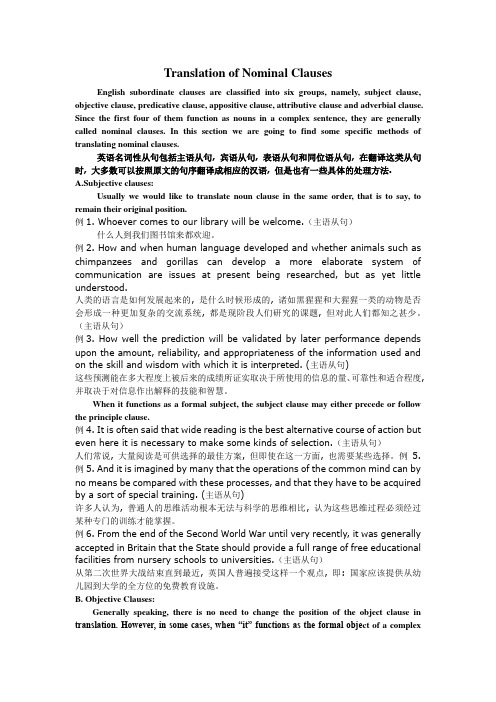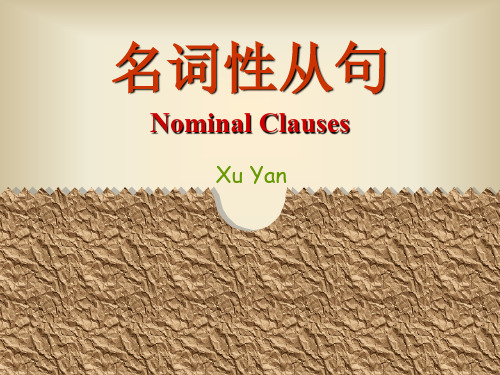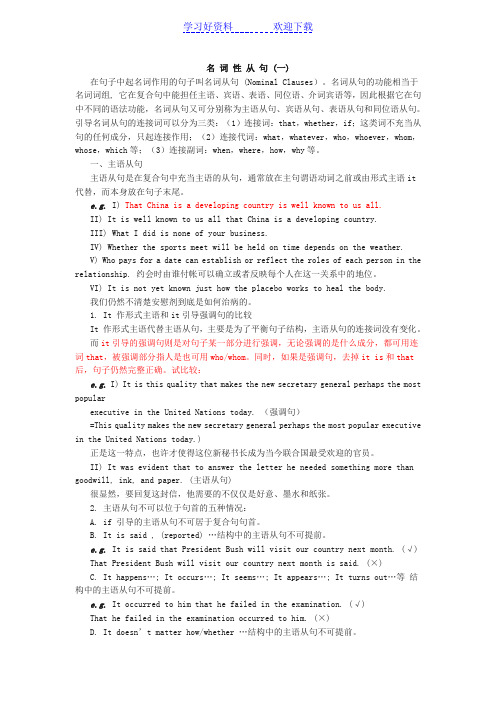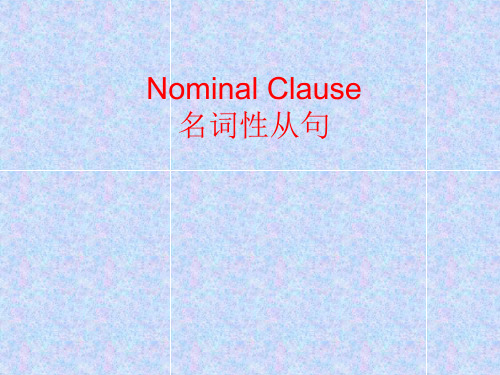Nominal Clause名词从句
- 格式:ppt
- 大小:208.50 KB
- 文档页数:15

名词性从句在高考英语作文中的应用全文共3篇示例,供读者参考篇1Noun clauses are often used in high school English composition because they are a versatile and effective way to add complexity and depth to writing. These clauses can serve various functions in a sentence, such as acting as subjects, objects, or complements. They also allow writers to convey ideas in a more succinct and coherent manner.One common use of noun clauses in high school English composition is to provide additional information about a specific topic. For example, in a persuasive essay about the importance of recycling, a writer might include a noun clause that serves as the direct object of a verb, such as "I believe that recycling can make a significant impact on the environment." This noun clause expands on the writer's opinion and provides further context for the argument.Another way noun clauses are used in high school English composition is to introduce a quotation or report someone else's opinion. For instance, in a research paper on the effects of socialmedia on teenagers, a writer might include a noun clause that acts as the subject of a sentence, such as "Studies have shown that excessive use of social media can lead to decreased academic performance." This allows the writer to present a factual statement without inserting their own opinion.Noun clauses can also be used to create complex sentences that showcase a writer's ability to manipulate language effectively. By incorporating subordinate clauses into their writing, students can demonstrate their proficiency in grammar and syntax while adding sophistication to their arguments. For example, in a literary analysis essay on Shakespeare's "Hamlet," a student might include a noun clause that serves as the object of a preposition, such as "The protagonist's inner turmoil is evident in his soliloquies, where he questions whether 'to be or not to be.'"In conclusion, noun clauses are a valuable tool for high school students in English composition. By understanding how to use these clauses effectively, students can enhance the clarity and complexity of their writing. Whether providing additional information, introducing quotations, or creating complex sentences, noun clauses are a versatile resource that can help students succeed in their academic endeavors.篇2The Application of Noun Clauses in English Writing in the College Entrance ExaminationIn the English writing section of the college entrance examination, one essential grammatical structure that students need to master is noun clauses. Noun clauses, also known as nominal clauses, function as a noun within a sentence and can serve a variety of purposes, such as subject, object, complement, or appositive. Understanding how to use noun clauses correctly can greatly enhance the clarity and cohesion of one's writing. In this article, we will explore the application of noun clauses in high school English essays and provide examples of how they can be effectively integrated into writing.One common way in which noun clauses are used in essays is as a subject of a sentence. For example, in a persuasive essay on the importance of environmental conservation, a student might write: "What we do now will have a significant impact on the future of our planet." In this sentence, the noun clause "What we do now" functions as the subject of the sentence, emphasizing the importance of taking action to protect the environment.Noun clauses can also be used as the object of a verb, such as in the sentence: "I believe that education is the key to a better future." Here, the noun clause "that education is the key to a better future" serves as the direct object of the verb "believe," expressing the speaker's belief about the importance of education.Moreover, noun clauses can function as complements in a sentence, providing additional information about the subject or object. For instance, in a discussion of the factors that contribute to success, a student might write: "The idea that hard work leads to success is a common belief." In this sentence, the noun clause "that hard work leads to success" serves as the complement of the subject "idea," elucidating the common belief about the relationship between hard work and success.In addition to serving as subjects, objects, and complements, noun clauses can also be used as appositives, providing further explanation or clarification. For example, in a description of a memorable experience, a student might write: "My dream of becoming a doctor, which had been nurtured since childhood, finally came true." Here, the noun clause "which had been nurtured since childhood" serves as an appositive to the noun"dream," providing additional information about the persistence of the student's goal.In conclusion, noun clauses play a crucial role in enhancing the coherence and precision of writing in the college entrance examination. By mastering the use of noun clauses as subjects, objects, complements, and appositives, students can effectively convey their ideas and arguments in a clear and organized manner. Therefore, it is essential for students to familiarize themselves with the various functions of noun clauses and practice incorporating them into their essays. With diligent study and practice, students can confidently apply noun clauses in their writing and achieve success in the English writing section of the college entrance examination.篇3The Application of Noun Clauses in the English Composition of the College Entrance ExaminationIntroductionIn the English composition of the college entrance examination, noun clauses play a significant role in enhancing the complexity and coherence of the writing. Noun clauses are subordinate clauses that act as nouns in a sentence, and they canfunction as subjects, objects, complements, or possessives. By using noun clauses effectively, students can demonstrate their proficiency in grammar, vocabulary, and sentence structure, thus earning higher scores in the examination. This article will explore the application of noun clauses in the English composition of the college entrance examination and provide examples to demonstrate their effective use.1. Noun Clauses as SubjectsOne of the common uses of noun clauses in English composition is as subjects in a sentence. Noun clauses that function as subjects typically begin with words such as "that," "who," "what," "where," or "how." For example, in the sentence "What she said surprised everyone," the noun clause "What she said" functions as the subject of the sentence. By using noun clauses as subjects, students can vary their sentence structures and create more engaging and sophisticated compositions.2. Noun Clauses as ObjectsNoun clauses can also be used as objects in a sentence, either as direct objects, indirect objects, or objects of prepositions. Noun clauses that function as objects typically begin with words such as "that," "if," "whether," or "why." For example, in the sentence "I wonder whether he will come to theparty," the noun clause "whether he will come to the party" functions as the object of the verb "wonder." By using noun clauses as objects, students can convey their thoughts and opinions more effectively in their compositions.3. Noun Clauses as ComplementsNoun clauses can also be used as complements in a sentence, either as subject complements or object complements. Noun clauses that function as subject complements typically begin with words such as "that," "what," or "who." For example, in the sentence "His only wish is that she accepts his apology," the noun clause "that she accepts his apology" functions as the subject complement of the verb "is." By using noun clauses as complements, students can provide additional information and clarification in their compositions.4. Noun Clauses as PossessivesNoun clauses can also be used as possessives in a sentence, indicating ownership or relationship. Noun clauses that function as possessives typically begin with words such as "whose," "where," or "of which." For example, in the sentence "The book whose cover is torn belongs to me," the noun clause "whose cover is torn" functions as the possessive of the noun "book." By using noun clauses as possessives, students can show theirunderstanding of relationships and connections in their compositions.ConclusionIn conclusion, noun clauses are valuable tools for students to enhance the complexity and coherence of their English compositions in the college entrance examination. By using noun clauses as subjects, objects, complements, or possessives, students can demonstrate their proficiency in grammar, vocabulary, and sentence structure. Through effective application of noun clauses, students can create more engaging and sophisticated compositions, thus increasing their chances of earning higher scores in the examination. It is essential for students to practice using noun clauses in their writing to improve their overall English proficiency and succeed in the college entrance examination.。

Translation of Nominal ClausesEnglish subordinate clauses are classified into six groups, namely, subject clause, objective clause, predicative clause, appositive clause, attributive clause and adverbial clause. Since the first four of them function as nouns in a complex sentence, they are generally called nominal clauses. In this section we are going to find some specific methods of translating nominal clauses.英语名词性从句包括主语从句, 宾语从句, 表语从句和同位语从句, 在翻译这类从句时, 大多数可以按照原文的句序翻译成相应的汉语, 但是也有一些具体的处理方法.A.Subjective clauses:Usually we would like to translate noun clause in the same order, that is to say, to remain their original position.例1. Whoever comes to our library will be welcome.(主语从句)什么人到我们图书馆来都欢迎。
例2. How and when human language developed and whether animals such as chimpanzees and gorillas can develop a more elaborate system of communication are issues at present being researched, but as yet little understood.人类的语言是如何发展起来的, 是什么时候形成的, 诸如黑猩猩和大猩猩一类的动物是否会形成一种更加复杂的交流系统, 都是现阶段人们研究的课题, 但对此人们都知之甚少。


名词性从句 (一)在句子中起名词作用的句子叫名词从句 (Nominal Clauses)。
名词从句的功能相当于名词词组, 它在复合句中能担任主语、宾语、表语、同位语、介词宾语等,因此根据它在句中不同的语法功能,名词从句又可分别称为主语从句、宾语从句、表语从句和同位语从句。
引导名词从句的连接词可以分为三类:(1)连接词:that,whether,if;这类词不充当从句的任何成分,只起连接作用;(2)连接代词:what,whatever,who,whoever,whom,whose,which等;(3)连接副词:when,where,how,why等。
一、主语从句主语从句是在复合句中充当主语的从句,通常放在主句谓语动词之前或由形式主语it 代替,而本身放在句子末尾。
e.g. I) That China is a developing country is well known to us all.II) It is well known to us all that China is a developing country.III) What I did is none of your business.IV) Whether the sports meet will be held on time depends on the weather.V) Who pays for a date can establish or reflect the roles of each person in the relationship. 约会时由谁付帐可以确立或者反映每个人在这一关系中的地位。
VI) It is not yet known just how the placebo works to heal the body.我们仍然不清楚安慰剂到底是如何治病的。
1. It 作形式主语和it引导强调句的比较It 作形式主语代替主语从句,主要是为了平衡句子结构,主语从句的连接词没有变化。

None Clauses在句子中起名词作用的句子叫名词从句(Noun Clauses)。
名词从句的功能相当于名词词组, 它在复合句中能担任主语、宾语、表语、同位语、介词宾语等,因此根据它在句中不同的语法功能,名词从句又可分引导名词性从句的连接词引导名词性从句的连接词可分为三类:连接词:that, whether, if 不充当从句的任何成分连接代词:what, whatever, who, whoever, whom, whose, which.连接副词:when, where, how, why一主语从句Subject clause主语从句在句中作主语,它的位置与陈述句基本结构中的主语相同,引导主语从句的词有:1)连词that (无词义),whether (是否)例如:Whether the 11th sports meeting will be held in our city has not been decided. Tips:已经确定的事情that引导,没有确定的whether引导2)连接代词:what; who; which; whose;whoever; whatever; whicheverE.g. What he is has nothing to do with you 谁去参加这次能源大会并不重要Who will go to the energy conference is not importantWhatever she wants is fine with me3)连接副词when, where, wherever, why, how, 以及与how 组成的短语how long,how often, how soon, how far, howmany, how much等How we can protect the grain from damp needs to be discussed.他去哪都与我无关Wherever he goes has nothing to do with me.Attention:1)很多主语从句都可以用在it作形式主语的句子中It is not important who will go.It is still unknown which team will win the match.用it作形式主语的that-从句有以下四种不同的搭It is necessary that…有必要……It is important that…重要的是……It is obvious that…很明显……b. It + be + -ed 分词+ that-从句It is believed that…人们相信……It is known to all that…众所周知……It has been decided that…已决定……c. It + be +名词+ that-从句It is common knowledge that………是常识It is a surprise that…令人惊奇的是……It is a fact that…事实是……d. It +不及物动词+ that-分句It appears t hat…似乎……It happens that…碰巧……It occurred to me that…我突然想起……2)连接代词和连接副词引导的主语从句是由特殊疑问句转化而来的,要用陈述语序E.g. What the weather will be like for the next three days is of great importance. How much we can spend must be agreed on.whether 引导主语从句时,不能用if 替换宾语从句的位置与陈述句基本结构中的宾语相同,宾语从句可以作为谓语动词的宾语,也可作为介词和非限定动词(动词不定式,动名词,分词)和某些形容词的宾语。
